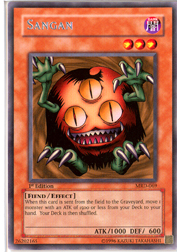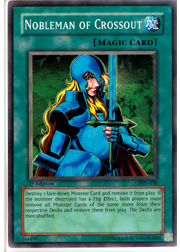This week, we’re taking a break from the usual metagame talk in order to make room for something that should be common knowledge: preparing an accurate tournament decklist.
Jason, my boss, recently made me aware of a shocking statistic: 5% of players at the Costa Mesa Shonen Jump Championship took a game loss for submitting an incorrect decklist. That’s 50 players!* While this may seem trivial, consider the implications of earning yourself a game loss during your tournament day. The last thing you need is to hear Mr. Judge Man telling you that your decklist was filled out incorrectly. Next, you realize that this loss will place you in a tough position in a difficult match. What if you end up losing that match? You threw it away to something that should have warranted more attention on your part. Let’s go over the different types of decklist mistakes you can make and how to avoid them.
Deck Error: Illegal Decklist
This specific penalty, as outlined by the Yu-Gi-Oh! policy documents on Upper Deck’s Organized Play page, involves the use of decklists. Being one of the most common errors made by even the best players, this happens when the actual deck is legal, but the decklist is not. Something this small will earn you a game loss on the spot. Your decklist will be adjusted afterward, but that’s a hefty price to pay for a simple omission. Here’s an example:
 "A player’s decklist shows two copies of Sangan, a Limited card, in a Yu-Gi-Oh! TCG tournament. Her actual deck contains only one copy of Sangan and meets all other requirements for a legal deck. The judge issues a Game Loss penalty and removes the extra Sangan from the deck registration sheet."
"A player’s decklist shows two copies of Sangan, a Limited card, in a Yu-Gi-Oh! TCG tournament. Her actual deck contains only one copy of Sangan and meets all other requirements for a legal deck. The judge issues a Game Loss penalty and removes the extra Sangan from the deck registration sheet."
Being a judge, I see this all the time: even something as silly as a numerical error can get you a game loss. If you’re going to make alterations to your decklist after realizing your error, use the next line on your decklist instead of trying to write over it. This will keep the kind folks on the deck check team from becoming confused with your handwriting. Now, let’s look at another example:
"A player registers 38 cards in his deck in a Yu-Gi-Oh! TCG tournament. His actual deck contains 40 cards. The judge issues a Game Loss penalty and adds the two missing cards from the deck to the deck registration sheet."
In this poor gentleman’s case, he’s committed a crime of omission. We all know, intrinsically, that we should play with a 40-card minimum, but this does happen.
Deck Error: Illegal Deck
This rulings infraction involves presenting an illegal deck during a tournament. It’s possible for you to fix the deck to match what is written on your deck registration sheet. If your deck registration sheet is also illegal, then it is possible to repair it as well. First, you fix the deck by making it legal. Second, you fix the deck sheet to match the contents of the new deck. Here are two subtle, yet important scenarios that can earn you a game loss.
Scenario 1:
"A player registers 40 cards on her Yu-Gi-Oh! TCG deck registration sheet but presents a 39-card deck. The judge issues a Game Loss penalty, and the player must make her deck match her legal deck registration sheet."
Scenario 2:
"A player registers 39 cards on his Yu-Gi-Oh! TCG deck registration sheet and presents a 39-card deck. The judge issues a Game Loss penalty, and the player adds a legal card to the deck and corrects the deck registration sheet to match the corrected deck."
If you’re the industrious type and you want to save yourself some time during registration, I suggest that you type your decklist instead of writing it on the spot. I remember rushing to fill out my decklist on tournament day in order to avoid late registration fees or not finishing before round 1. It was never fun and when you’re in a hurry, nobody seems to have a spare pencil or pen. It happens to me all the time and I think I’ll start typing up my decklist to save myself this trouble. If you think you might want to make adjustments to your deck the morning of your event, just go ahead and leave a bit of space after each section on the decklist: monsters, spells, traps, side deck, and Fusions. Then you can cross off cards and add them as necessary without having a bunch of crazy arrows going everywhere.
Registration is a necessary evil and while typing up your decklist is a nice time-saving technique, it’s important to know how to type it correctly. Here are the guidelines:
1-List monsters, spells, and traps in their own columns. This applies to your side deck and your Fusion deck as well. Include the totals at the bottom of each column too.
2-Include your full name, date, and UDE number at the top of your typed decklist.
3-Type your decklist in a generic font such as Times New Roman, Arial, or Calibri. Special fonts can be hard for the judges to read and can lead to potential misunderstandings that result in game losses.
 4-Do not use abbreviations: not everyone uses the same abbreviations for a card. Nobleman of Crossout is a clear-cut example. Some duelists call it "Nobleman" while some call it "Crossout." The latter is easily recognized, but the former can be confused with Nobleman-Eater Bug or Nobleman of Extermination. Besides, you’re typing your decklist before the tournament so you have the time to enter the full name of each card in your deck, right?
4-Do not use abbreviations: not everyone uses the same abbreviations for a card. Nobleman of Crossout is a clear-cut example. Some duelists call it "Nobleman" while some call it "Crossout." The latter is easily recognized, but the former can be confused with Nobleman-Eater Bug or Nobleman of Extermination. Besides, you’re typing your decklist before the tournament so you have the time to enter the full name of each card in your deck, right?
Final Thoughts
Remember that filling out your decklist properly can be just as important as getting the appropriate amount of testing done prior to the tournament. The last thing you need after traveling 500 miles to a Shonen Jump Championship is to reward yourself with a game loss that can potentially knock you out of Day 2. Even the better players can fall victim to crimes of omission with their decklists. Decklist errors are easy to correct, but they’re even easier to miss. Please be sure to double-check yours before you submit it to the judges. Your tournament day depends on it!
—Bryan Camareno
*Jason’s Note: It was actually slightly higher than 5%, but even the conservative number I gave Bryan is pretty terrifying. Special thanks to Level 3 Judge John Danker, who headed the deck check team in Costa Mesa and provided me with the jaw-dropping statistic.